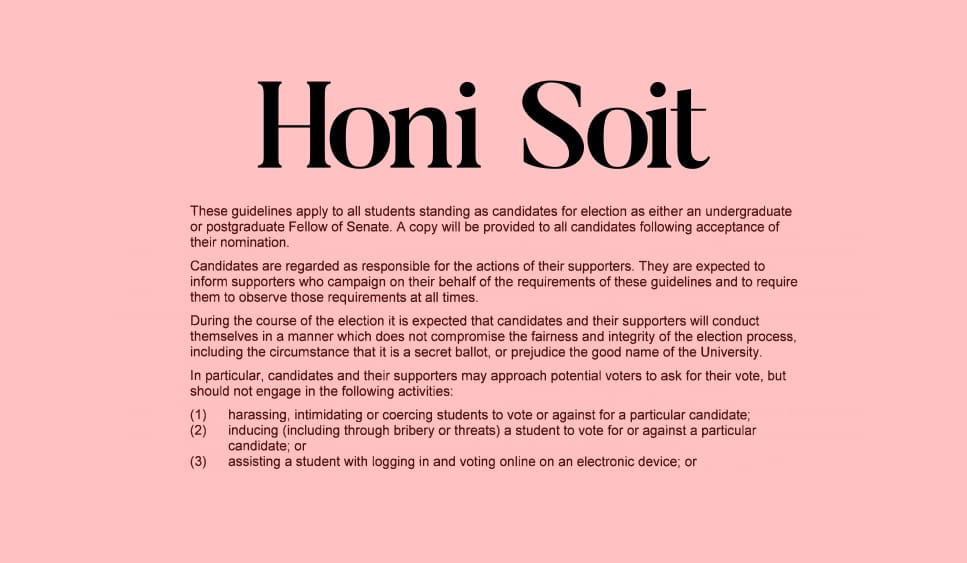Last Sunday afternoon, an Honi editor was studying in the quiet zone of Fisher level four, when a Senate candidate asked for her vote. He said he wanted to lower university fees.
As he walked away, she noticed that he only approached other non-white students.
Over the past week Honi has received over 30 similar reports. Students complained about campaigners harassing them during tutorials, racially profiling them and handing them a laptop and standing over them until they vote.
On Thursday night, campus security were called to a physical altercation between a student and a campaigner who was seeking their vote.
The University of Sydney Senate is the control centre of this billion-dollar institution. The Senate approves colossal building projects, it renews the Vice-Chancellor’s $1.3 million employment contract and authorises vertical degrees and staff cuts. Of its 20 fellows, two are ‘democratically elected’ students.
The system by which these student representatives are elected is completely broken.
Although the ‘guidelines’ prohibit candidates “harassing, intimidating or coercing students to vote”, they have been interpreted to allow soliciting votes with laptops. There is nothing to guarantee students know what they are voting for or that they feel safe doing so.
Even when breached, the guidelines have no power. It is “expected that candidates and their supporters” will follow them, but no consequences are threatened for non-compliance. In fact, despite numerous complaints made to the Returning Officer, David Pacey, there has been no disciplinary action beyond a reminder email to candidates.
These guidelines are also hidden from students. They only exist in emails sent to each candidate at the start of the campaign; the student being harassed in Fisher cannot access them to understand how they have been wronged.
Proving wrongdoing is effectively impossible. To spoil one vote, a student must produce a photograph over the shoulder of a campaigner, standing under a metre away as they enter a vote, breaching the requirement of a “secret ballot” (University of Sydney By-law 1999, s 34). Given the Returning Officer’s ongoing reluctance to discipline candidates, we can only assume this trick would need to be repeated countless times. [note] Possibly resulting in the sacrifice of many favourite mugs [/note]
The system is set up to incentivise unethical behaviour. Two years ago, Senate fellow Dalton Fogarty was accused of similar behaviour, but served the entirety of his term uninterrupted. “It is akin to putting Dracula in charge of the blood bank,” then outgoing Senate fellow Patrick Massarani said following that incident.
The candidates who have breached these rules most flagrantly have also avoided declaring their policies or beliefs publicly. They rejected Honi’s offer for a profile in our Week 8 edition, and did not attend our soapbox event. They would be elected without a platform or a mandate.
David Pacey needs to take disciplinary action, and candidates who have repeatedly breached the rules must be disqualified.
If they are not, the 33,000 undergraduate students who study at this University will be represented on the Senate by a man who received his position, and the immense power that comes with it, by virtue of intimidation, harassment and flagrant disregard for the integrity of the Senate’s electoral guidelines.
In future elections, allowing campaigners to solicit votes with laptops should not be permitted.
We have seen how this system is ripe for abuse; it needs to be thrown out and the rules rewritten.





